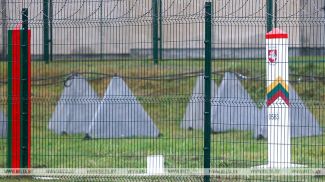
MINSK, 1 March (BelTA) - In January-February 2024 Russian companies made $131.8 million worth of transactions on the Belarusian Universal Commodity Exchange, which was 6.6 times more than in January-February 2023. Trade in agricultural products was particularly robust, providing more than 60% of the exchange trade with Russia, Deputy Head of Foreign Economic Relations at BUCE German Puzyrny said during the General Multisectoral Consultation event organized by the Russian Export Center for business communities from 20 regions of Russia, BelTA learned from the press service of the Belarusian Universal Commodity Exchange (BUCE).
The video conference brought together experts from the Belarusian representative office of the Russian Export Center, the National Center for Marketing and the National Exhibition Center BelExpo. Presenting the capabilities of BUCE, German Puzyrny stressed that this year Russian business is showing an increased interest in the Belarusian commodity exchange. The result is a significant increase in the number and volume of transactions.
"We can say that Belarusian exchange export to Russia demonstrates record high dynamics. In January-February last year it was a little less than $3 million. This year we have already crossed the $97 million mark. Dairy products such as butter, milk powder and cheese are in the greatest demand among Russian bidders. Of the non-food products, timber and cellular concrete blocks are most popular. They accounted for 9% and 7% respectively of the exchange export to the Russian market. As for imports from Russia, it increased by 2.3 times - mainly due to ferrous metal products and coal, which were purchased by Belarusian industrial enterprises accredited on the commodity exchange," German Puzyrny noted.
The public joint-stock company (OAO) Belarusian Universal Commodity Exchange was established in 2004. BUCE is one of the largest mercantile exchanges in Eastern Europe. Its key function is to assist Belarusian companies with exporting their products and assist foreign companies with entering the Belarusian market. The commodity exchange facilitates trade in metals, timber, agricultural products, and a broad choice of industrial and consumer goods.
As of 29 February, 2024, 3,703 business entities from 52 regions of the Russian Federation were accredited at BUCE. Seven companies had the status of brokers.
The video conference brought together experts from the Belarusian representative office of the Russian Export Center, the National Center for Marketing and the National Exhibition Center BelExpo. Presenting the capabilities of BUCE, German Puzyrny stressed that this year Russian business is showing an increased interest in the Belarusian commodity exchange. The result is a significant increase in the number and volume of transactions.
"We can say that Belarusian exchange export to Russia demonstrates record high dynamics. In January-February last year it was a little less than $3 million. This year we have already crossed the $97 million mark. Dairy products such as butter, milk powder and cheese are in the greatest demand among Russian bidders. Of the non-food products, timber and cellular concrete blocks are most popular. They accounted for 9% and 7% respectively of the exchange export to the Russian market. As for imports from Russia, it increased by 2.3 times - mainly due to ferrous metal products and coal, which were purchased by Belarusian industrial enterprises accredited on the commodity exchange," German Puzyrny noted.
The public joint-stock company (OAO) Belarusian Universal Commodity Exchange was established in 2004. BUCE is one of the largest mercantile exchanges in Eastern Europe. Its key function is to assist Belarusian companies with exporting their products and assist foreign companies with entering the Belarusian market. The commodity exchange facilitates trade in metals, timber, agricultural products, and a broad choice of industrial and consumer goods.
As of 29 February, 2024, 3,703 business entities from 52 regions of the Russian Federation were accredited at BUCE. Seven companies had the status of brokers.













